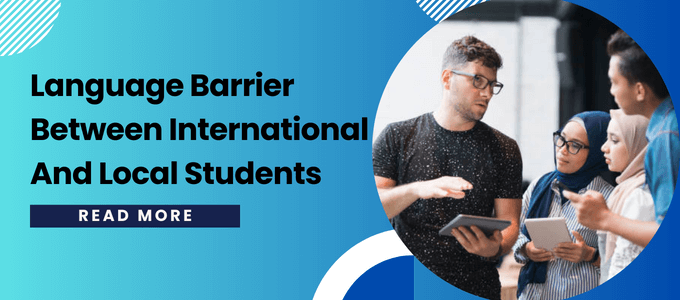Language Barrier Between International And Local Students
April 21, 2024
Anis

Malaysia is becoming a popular destination for students worldwide who want to pursue their studies.
Its universities offer a wide range of programs at affordable tuition fees and provide a great opportunity to experience different cultures.
However, despite the many advantages of studying in Malaysia, international students often struggle with a common issue - language barriers.
This article explores the challenges international students face due to language barriers in Malaysia.
It also suggests some solutions to help them overcome these obstacles.
Understanding Language Barrier
Communicating with people who speak different languages or have varying levels of language proficiency can pose a challenge.
This circumstance is known as a language barrier. It can affect spoken and written communication between two speakers.
But what are the key factors that "contribute" to a language barrier?
Keep on reading for more insight about the language barrier.
Key factors of a language barrier
1. Language communication is not only about "interaction"

You read it right.
Language communication is not necessarily about an interaction between two speakers like "Hey" or "What's up?".
But language communication includes vocabulary, grammar, pronunciation, and, in certain cases, writing.
When two people, for instance, a Malay and an English native speaker, interact in English, do you think they completely understand one another?
It might be not.
"But they both speak the same language. How is this situation a language barrier?"
Keep in mind that language is beyond a simple interaction.
It is about understanding the context of interaction, word choice, and the continuity of a conversation.
This situation is familiar to university students of different nationalities, local and international.
So, if you experience this situation, remember to keep your conversation simple and understandable.
2. Different gestures and expressions

Each culture has gestures and expressions that may not have direct equivalents in other languages.
It may lead to misunderstandings or confusion.
Speaking of gestures, do you know that Malaysians raise their eyebrows when they meet someone they know?
It is a simple non-verbal communication like "Hi".
However, this gesture is strictly only for someone close to you. So, don't do it to your lecturers or seniors.
There are many simple non-verbal gestures that Malaysians do.
So international students, do not feel left out. Just observe their body language and ask the local students what it indicates.
Sooner or later, you will be able to pick up the gestures and have a more casual conversation with Malaysian students.
3. Expression, phrases, and pragmatics.
Understanding the appropriate context for certain phrases, expressions, or pragmatics is also essential for effective communication.
Language barriers can have profound social and psychological effects.
It may cause social isolation, impacting personal relationships, and educational attainment.
Therefore, you must understand the rule of thumb when conversing with someone.
To ensure a cohesive conversation, you must apply these rules, which are tone, changing the language formality (depending on who the listener is), taking turns, and staying on the topic.
4. Written communication
Language barriers can also manifest in written communication, such as emails, documents, or any written content where language proficiency and clarity are essential.
While technology can help bridge language barriers with translation apps and software, these tools may not always provide accurate translations, especially for complex or context-dependent content.
What Are The Challenges Of Language Barrier?
Malaysia's cultural and linguistic landscape is diverse, with Bahasa Malaysia as the official language.
The country is home to various ethnic groups, including Malays, Chinese, Indians, and indigenous communities, each with their own languages and dialects.
However, English is commonly used in academic and business settings.
This can pose a challenge for international students who may not be familiar with Malay or the local dialects.
1. English language proficiency
Despite the common use of English in higher education, many international students struggle with language proficiency, especially those from non-English speaking countries.
Insufficient English language skills may hinder their academic performance, comprehension, and communication with local peers and lecturers.
2. Classroom challenges
International students face various classroom challenges due to language barriers, such as understanding lectures, participating in discussions, and submitting assignments in English.
This can lead to isolation and frustration, potentially impacting the overall educational experience.
3. Social interactions
Language plays a significant role in social interactions.
International students often struggle to integrate into local communities and make friends when language differences hinder communication.
This situation can lead to loneliness and isolation, affecting mental well-being.
Occasionally, misunderstandings can arise when international students misinterpret language and gestures.
It leads to unintentional miscommunications or offenses.
How To Overcome Language Barrier Problem?
1. Join English language courses

Malaysian universities often offer English language courses designed for international students to overcome the language barrier challenges.
These courses can help to improve language proficiency.
It allows students to cope better with academic demands and daily life.
2. Language exchange program between international and local students
Encouraging language exchange programs between international and local students can also benefit both parties.
It allows international students to practice their language skills while helping local students learn about other people's cultures.
It's like a barter system, right?
Furthermore, educating university students about cultural differences can foster cultural sensitivity.
It prevents misunderstanding and promotes harmony within the institution community.
3. Organize cultural festivals
Workshops, seminars, and cultural exchange events can be effective tools for achieving this goal.
Universities can also organize integration initiatives such as cultural festivals, language clubs, and international student associations.
It encourages interaction between students from diverse backgrounds, helping to bridge language and cultural gaps.
Studying abroad in Malaysia can be a wonderful and enriching experience for international students.
However, the language barrier can significantly impact academic success and well-being.
To create a more inclusive and supportive environment for international students, local universities and students can take proactive measures.
Language courses and cultural awareness programs can help international students overcome language barriers.
It also enhances their educational experiences and develops meaningful connections with the local community.
As Malaysia is a popular destination for international education, addressing these language challenges is essential for the success and satisfaction of its diverse student population.
Kickstart your education in Malaysia
We'll help you find and apply for your dream university
You might be interested in...
- Promoting Health and Well-being: Initiatives by Universities in Malaysia
- Raising Awareness of the Threat of Microplastics Pollution on International Mother Earth Day
- Exploring Distance Learning: Course Offerings at Universities in Malaysia
- The Role of Education in Promoting Health Equity: Lessons from World Health Day 2024
- Navigating Credit Transfers: A Guide for Students Switching Institutions
- Explore the Benefits of Studying in Malaysia After SPM Examination
- SPM Leavers’ Guide to Malaysian Scholarships: Types, General Requirements, and Practical Tips
- Crafting a Greener Tomorrow: Empowering Change through Zero Waste and Upcycling Practices
- Malaysian Higher Education's Global Outreach: Collaborations with International Institutions
- Initiatives by Universities in Malaysia to Prepare Students for Globalization








